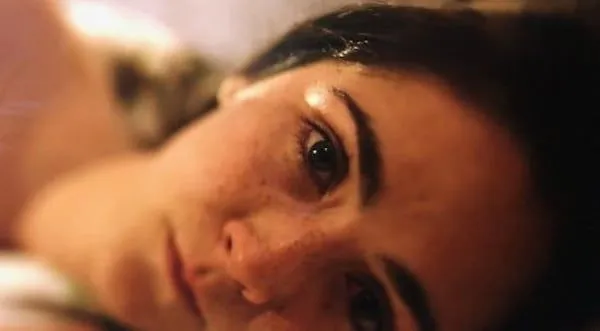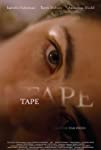Eye For Film >> Movies >> Tape (2020) Film Review
Tape
Reviewed by: Jennie Kermode

The Me Too movement has done a lot to raise awareness of sexual exploitation and abuse in the film industry, but cultural understanding of how it happens still has a long way to go. Based on real events that happened to a friend of director Deborah Kampmeier, this film explores some of the factors that make young actresses vulnerable to abuse and some of the reasons why they might not wish to talk about it afterwards.
It begins with Rosa (Annarosa Mudd) shaving off her long dark hair, piercing her tongue and putting on dark lipstick and shades, a traditional cinematic post-trauma transformation which now has added reference because of the particular resemblance it conjures up. As well as changing the way she looks - and shedding characteristics she associates with the way she was targeted - she's strapping tiny cameras and wires to her body: going prepared.

For what? At the audition she attends, not a great deal seems to happen. There's some concern about one of those attending being younger than she claims to be, but she's treated with sympathy and concerns by the others - most notably Pearl (Isabelle Fuhrman). It's Pear whom we follow when, disappointed that she hasn't got one of the five roles on offer, she is approached in the street by director Lux (Tarek Bishara), who tells her that she just wasn't right for the part but that he can see she's talented and wants to mentor her. This will immediately ring alarms bells for many viewers but Pearl is young, exhausted from a lengthy struggle to secure the work for which she spent years training, and anxious to provide not just for herself but also for her mother.
What happens next is predictable enough, but that's not to the film's detriment - part of the point is that the story it has t tell has happened over and over again, with the difference, this time, that Rosa is observing as closely as she can and collecting evidence. Kampmeier's choice of drab locations, dimly lit, means this is far from the imagined glamour of Hollywood, and anybody who has been unemployed and gone through the drudgery of pursuing one slight lead after another will be able to relate to it. When Pearl and Lux try out a scene together we can see that she's talented - that it's simply lack of opportunity that has placed her in this position, making it all the more frustrating. The small compromises she makes, the small risks she takes, are understandable, even though the audience can see how they'e adding up and she's losing control.
Inevitably, there's a voyeuristic element to this, but again those drab locations come to the rescue. Kampmeier shows us Pearl's vulnerability without making it titillating, and an atmosphere of misery pervades the whole thing. The flip side, of course, is that despite its dramatic quality the film is a difficult watch and risks sliding into an emotional monotone. Is Kampmeier saying enough that's new to make enduring this worthwhile? Is it something that every film fan owes to the women who have suffered in the industry? Those are questions that individual viewers will have to answer for themselves.
If there's a lesson here for perpetrators, it's that if one messes with actors, they may utilise their skills to respond. Rosa's initial transformation may be over the top - she draws far too much attention to herself, looking like she's stepped out of a spy movie - but the ways in which she improvises to get what she wants from people are impressive. She only slips up when circumstances force her real emotions to the surface, demonstrating some of the long term damage done.
If there's one other important point that the film has to make, beyond a focus on the importance of victims fighting back, it's that exploitation (and worse) like this didn't end with Me Too. Economic insecurity and broader attitudes to women make it a danger in every industry, and the constant need to seek new work in acting concentrates the problem, meaning that ongoing vigilance is essential to bringing about real change. Ultimately, the film is most effective as a warning due to the ordinariness of what it depicts.
Reviewed on: 23 Jun 2020

















